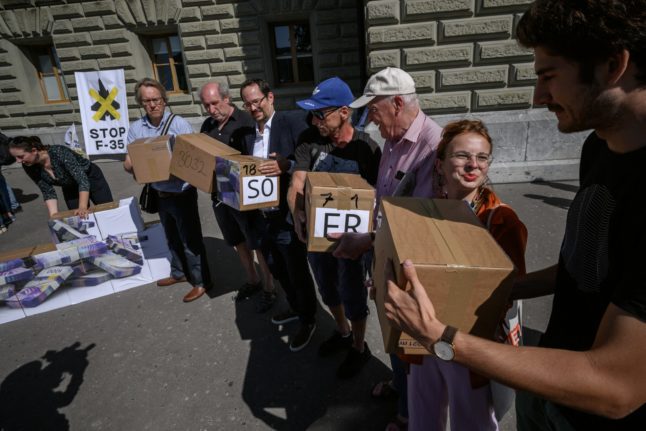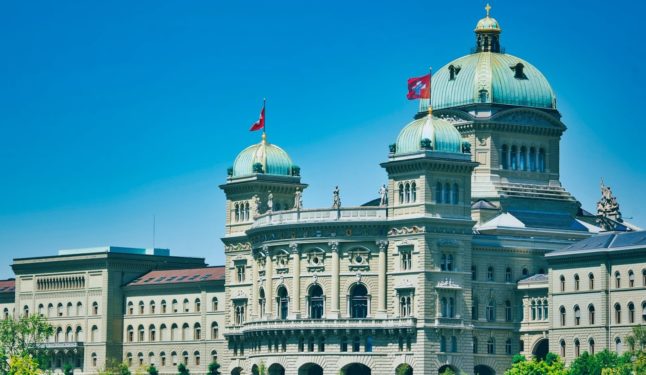Voters’ signatures are a precious commodity in the Swiss political system, making it possible for political parties or interest groups to introduce or overturn laws through popular initiatives and referendums. It is worrying that this process is no longer fully grassroots driven.
The fact that the activity of collecting signatures for popular initiatives or referendums has become a money-making business in the gig economy surely means the process is compromised. At the very least, it is a disappointing development, especially in a country that prides itself on the merits of its democracy.
Yet the government has given its blessing to this practice of companies hiring people on a pay-per-signature basis, most recently blocking canton Neuchâtel in August of this year when it tried to ban the activity for federal votes.
OPINION: Why the Swiss are quitting the church and taking their money with them
Useful tool
Popular initiatives have been part of the political process since 1891. Citizens who feel strongly about a given issue can literally write a text for a new law. If they manage to collect 100,000 voters’ signatures supporting the text within 18 months, it will be put to a national vote.
There are currently 24 initiatives at the signature-gathering stage. Generally, a third of them don’t make the target on time. The open issues include energy provision, healthcare, animal welfare, taxation, the use of cash, Swiss neutrality, pensions – and, as always, immigration.
For the two-thirds that get as far as a vote, a relatively small number (fewer than one in five) are ultimately accepted by voters. But the campaigns can pay off indirectly. It’s about getting your pet issue on the agenda.
The government will publish its position on the issue and may even put forward a counter proposal which will deliver some of the original goals of the initiative. A committee has the option to withdraw its initiative before the day of the vote if they are satisfied enough has been achieved.
Initiatives are an effective, and some say overused, tool that can be employed to shape national debate and policy. No wonder signatures are at a premium.
OPINION: The true signs you’re becoming more Swiss than the Swiss
A pricey business
The Swiss current affairs programme Rundschau published an invoice earlier this year that showed the pro-nuclear “Stop the blackout” initiative committee had been charged CHF7.50 per signature for 10,000 signatures in December 2022. Ultimately, the committee managed to collect 120,000 signatures ahead of the deadline.
One interesting feature of popular initiatives is that the titles can be creative, to say the least. The committees that launch them are free to choose snappy, alarmist or convoluted titles. It is sometimes a deliberate part of the strategy for the title of the initiative, which will be quoted in every media reference, to be vague.
That leaves room for interpretation. In recent years, several Swiss media outlets have reported that paid signature collectors gave citizens misleading information on the initiatives they were collecting for – in some cases directly contradicting the true purpose of the initiative.
It can no longer be assumed that people collecting signatures on the street are part of the group agitating for change. Paid collectors usually collect for several initiatives at a time, and tend to have only superficial knowledge about the issues.
Sitting outside in Fribourg city centre on a sunny Sunday afternoon last month, I was approached by a young man collecting signatures for a popular initiative. I heard him out, decided it was a good cause, and duly entered my details and signature on the form attached to his clipboard. He then whipped out another form for a vaguely related topic and asked me to sign for a second initiative. When he introduced a third completely random initiative, I started to feel we were both being exploited.
Level playing-field
So why does the government allow this to go on? They answered that question in a response to a parliamentary motion submitted by Social Democrat politician Mathias Reynard in 2020, saying it was the responsibility of the committees behind these campaigns to ensure that the signatures were collected in a honest way, whether the collectors are paid or not.
A ban would risk limiting access to smaller players, the government wrote: “For civil society committees, which have limited resources and cannot rely on established structures and distribution channels, a ‘per-signature’ payment may prove less costly than a collection made, for example, by means of mass mailings.”
The Swiss People’s Party is known for mass mailing its signature newspaper-style publication. In an interview with the news portal Watson, political scientist Flavia Coroni said this was the most expensive signature-collecting strategy she knew of.
“They launch an initiative and send their Extrablatt [publication] to more than three million households, with postage paid signature sheets included in each one.”
The reliance on paid collecting clearly shows that Swiss political campaigns are not attracting enough grassroots support. You don’t pay for something you could get for free. Some campaigns are entirely based on the paid-signature model but there is nothing to compel initiative campaigns to reveal their spending breakdown.
More transparency
At least there has been some concrete progress on political funding which used to be completely opaque. After years of pressure, and a 2017 initiative on transparency in political funding that moved things forward, political parties, campaigns and candidates now have to reveal their budgets and large donors.
For last month’s federal elections, parties and candidates had to follow new rules and disclose any donations above 15,000 francs, as well as budgets for campaigns that exceeded 50,000 francs. The two richest parties emerged as the Liberal-Radicals who had 12.4 million to spend on the election campaign, and the Swiss People’s Party with 11.2 million.
Getting voters to engage with the political process is what democracies rely on for legitimacy. Money plays a role in activating this engagement but we should not get to the point where competition for voters’ attention interferes with the core values of the democracy.
CLICK HERE to read more of Clare O’Dea’s views on modern Switzerland



 Please whitelist us to continue reading.
Please whitelist us to continue reading.
Member comments